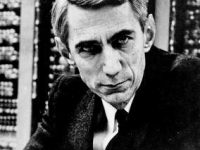Richard Hamming and the Hamming Code
On February 11, 1915, American mathematician Richard Wesley Hamming was born. Hamming’s work had many implications for computer science and telecommunications. His contributions include the Hamming code (which makes use of a Hamming matrix), the Hamming window, Hamming numbers, sphere-packing (or Hamming bound), and the Hamming distance. “The purpose of computation is insight, not numbers.” – Richard Wesley Hamming (1962) as quoted in [2] Richard Hamming – Youth and Education Richard Wesley…
Read more




